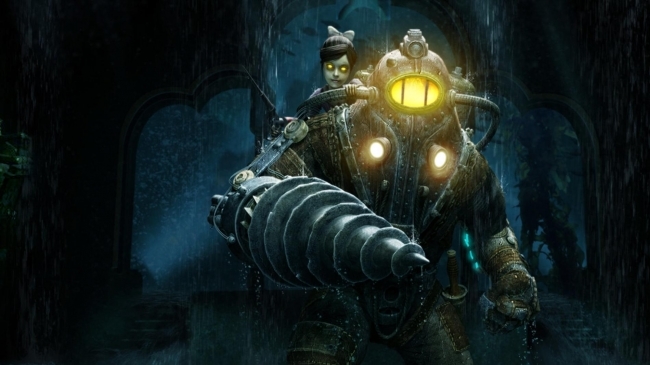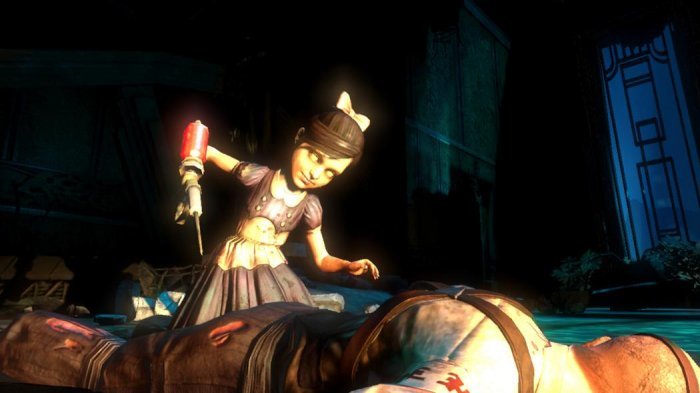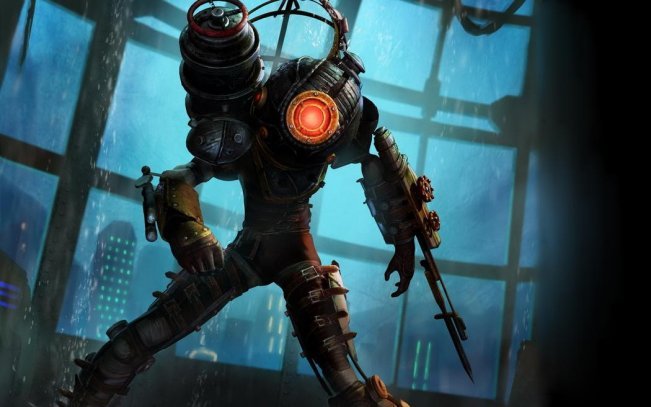Undervalued Bioshock 2

Perhaps you easily found out that Bioshock 2 looks like a cowardly, or at least an insecure game when you decided to play it immediately after its launch in 2010. Its predecessor, Bioshock, released three years earlier, seemed to have become an embankment at the rounded shores of gaming, marking the watershed where there was a place for both critical discussions and commercial ideas. The game questioned whether the games themselves, and the people who made them, are able to say something worthwhile and weighty, given the unpredictable behavior of the player himself. But at the same time, the game introduced fans of the genre of "shooter" with the philosophy of the writer Ayn Rand, demonstrating the ability to penetrate foreign subjects in the simplest form of entertainment.

And so Bioshock 2 inevitably ran into a wave of criticism, simply because it was not the usual continuation of Bioshock, becoming in the eyes of the public a target for unflattering feedback. He was the heir to the first part - the most significant game of the decade at that time, and in order to surpass his older brother, he needed not only to plunge into a much more insightful philosophical depth, but also to redefine his basic principle for people. But this did not happen, at least, is open to all.
The reviews, for the most part, were quite fair, and some reviewers, such as Tom Bramwell of Eurogamer, appreciated the game, finding an opportunity to praise Bioshock 2 for its refinement in comparison with the relative, but, unfortunately, the game was almost forgotten by today. . Bioshock 2 was locked up between its brethren - there was no place for it among the innovative Bioshock and explosive Bioshock Infinite, as if the parents paid less attention to the middle brother, which is very shameful, considering that he is the smartest and most sophisticated of the whole trinity.
Bioshock's first proclaimed satire on capitalism, mercantile spirit, and Ain Rand's work is far from as brave as the theme of the sequel, who preferred the concepts of society, collectivism, and altruism as his philosophical research. The goal of the antagonist, Dr. Sophia Lamb, is to attempt to effectively fill one person with genetic memories that are contained in people's blood in order to endow the latter with a physical understanding of the experience, desires, and needs of everyone else. Here, only the daughter of Sophia Lamb herself, named Eleanor, was chosen as the object of “true utopia”, and who in theory should become an effective and altruistic world leader, whose decisions will be based not on selfish ideology, but on inner empathy for all
The idea itself, however, took unpleasant consequences, being tested on researcher Aleksandra Gile, who instead of a benevolent leader who understood the needs of people, turned into a monster who had gone mad from the countless acquired experiences and desires that dragged his mind in all directions. In the future, the ideal of Sophia Lamb is compromised by her own methods, which turned into abductions, extortion and murder. She becomes a character who will stop at nothing to help people.
Ultimately, Bioshock 2 argues the impossibility of absolute altruism. It is impossible to take care of every person all the time - equally unshakably and equally, because there is no person or a specific system capable of balancing between the various experiences and experiences that people have. However, Bioshock 2 still recognizes that if such a system exists, it will still need a leader, and therefore the utilitarian society is shown hypocritical, which it is in the first place.
Sophia Lamb's criminal past is just an example of how a small amount of power, bestowed by a utopian, altruistic personality, can still be flawed, because in a world where everyone has an equal share, there is a person who has more power and influence than all the rest. Asking the question of the plausibility of the equal distribution of resources requires much more courage than attacks on Ayn Rand, greed and big business. And where Bioshock had arguments in favor of and against the player, Bioshock 2 takes a much tougher stance: the desires, expectations, and whims of other people are a cancerous tumor.
Alas, but Bioshock 2 was burdened with expectations, like Alexander Gil, and, like the "true heir of utopia," Eleanor. They came from the players, from the critics, from the publishing house 2K - from everyone who expected to see the sequel in a certain light for them. Therefore, the Bioshock 2 development team has become dependent on the demands of other people, forced to absorb them, like genetic memories that were contained in the blood. And if the original Bioshock questioned the honesty of the developer, as if hinting that it was worth ignoring what the game is talking about, then Bioshock 2 questioned the involvement of outsiders, believing that pressure and influence from the outside is exactly what harms the creative process. Alexander went mad when he tried to satisfy the needs of each individual person. Now imagine the developers of Bioshock 2 - trapped, frustrated and sinking under the weight of the things that were said to them, and how they should look in their game.

And if the designated conflict in Bioshock between a despotic developer and a capricious player was disgusting, then in Bioshock 2 it was the determination of the entertainment industry to be harmless, because it gave people everything possible. It may make sense to pay attention to feedback, whether from journalists, players, or from your own superiors. And the director of Bioshock 2, Dzhorzhan Thomas, with whom I met and spoke on various occasions, will be the last person to defend authorship first and foremost. Therefore, Bioshock 2 protests against the "development of a committee," against games, the purpose of which is to create comfort.
“Dadification” is a term you may have heard, particularly in this essay by Mattie Brice . He talks about a separate, but essentially common type of video game history, in which the playable protagonist plays the role of a man who is obliged to save or protect the sometimes young but always vulnerable female partner, who is essentially a surrogate daughter. Of the obvious examples of such stories - The Last of Us, Bioshock Infinite, Splinter Cell: Conviction, Silent Hill. Often, the relationship between father and daughter is romanticized in games, since the games themselves are created by middle-aged men who have children. Bioshock 2 describes this term as something monstrous and perverse.

The character you are playing under the codename Delta Object is one of the most iconic Big Daddies in the Bioshock series. Majestic, clumsy figure, which in its essence is half human, half car; he is obliged, under the influence of hypnosis and pheromones, to protect the "Little Sisters" - the grotesque young girls who collect blood from corpses. The bioshock 2’s “father” and “daughter” relationship is not based on love or even emotions — it is the result of chemicals and augmented biology. In addition, their relationships are reduced to fatherly shooting, stabbing and murder, while the daughter extracts blood from the dead, after drinking it, to process it back into raw genetic material, using its strangely modified internal organs.
There is nothing good or romantic in it - one nauseous, rejection and alienation. Bioshock can instill a bit of confidence in this, as it is a game that gave birth to “Big Daddies” and “Little Sisters”, but nevertheless Bioshock 2 tells almost completely about their relationship. In his foreground is an ugly, nightmarish notion of parenthood, in which love and the need to protect one’s children, is partly based on the work of chemicals and hormones inside the body. Unlike many other "fatherly" games, to be a father in Bioshock 2 is neither beautiful, but rather noble, a kind of dirty undertaking. The defender's instinct will not lead to a stunning denouement in which the father reunites with his daughter, and now she is saved, and again everything is fine. He simply sees how many enemies he kills while the little girl shamelessly drinks blood.

However, 5 years after the release, Bioshock 2 unfairly remains at the curb. He did not have a newly-born celebrity in the face of Ken Levin, who could advertise the game, as there was no good position, because the sequels of the most beloved new IPs are often doomed from birth, but this is really the best Bioshock. In its merits are majestic themes, much more interesting written script, rather than any of his fellows. But all of them are disguised as funny joke mechanics, and a bit too fun B-movie. Play an episode in which your friend, Sinclair, turns into a “Big Daddy”, and try not to smile.
But what ultimately elevates Bioshock 2 over their peers is self-awareness. He has neither the grandiose Bioshock, nor the pretentious Bioshock Infinite, who show little concern for their own stupidity, bloodthirstiness, or an absolutely absurd battle system - so much so that it becomes difficult to believe what they want to say. Bioshock 2 entertains with shooting, bloodshed, and general appearance, but is still equipped with a philosophical and ideological knife tied to the ankle. This is a very smart game. This is Bioshock, which is worth it.
')
Source: https://habr.com/ru/post/402409/
All Articles